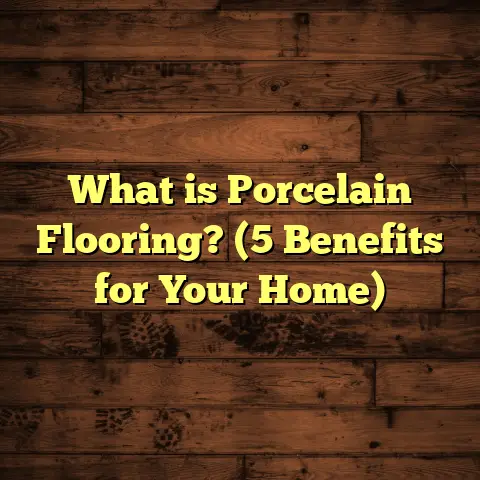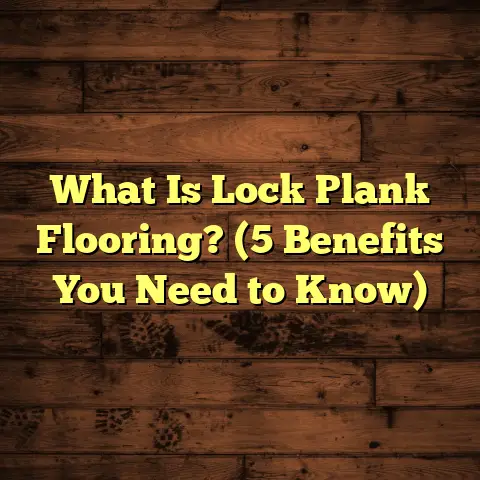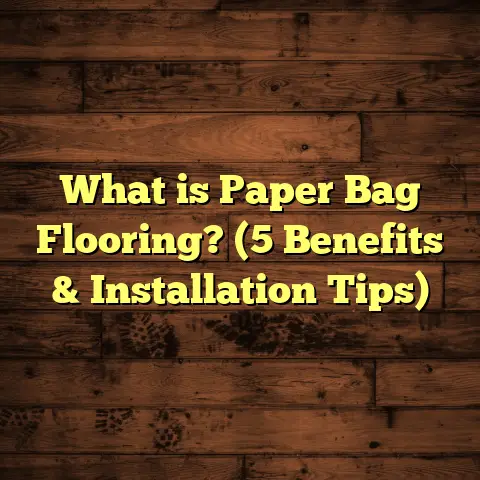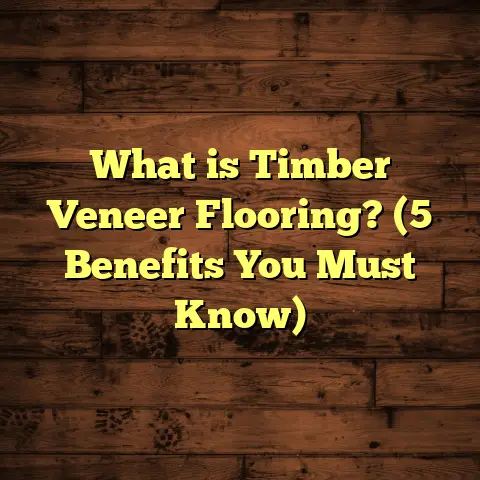What is a More Potent Floor Cleaner Than Pine-Sol? (5 Powerful Alternatives)
Crafting Floors That Shine: My Journey with Potent Floor Cleaners
When I first started working as a flooring contractor, I quickly realized that the art of craftsmanship didn’t stop with installing floors—it extended into maintaining their beauty and durability over time. Cleaning floors effectively is part of that craft. Over the years, I’ve tested countless cleaning products, trying to find solutions that actually deliver the clean I promise my clients without damaging their precious floors.
One product that almost everyone knows is Pine-Sol. It’s been a household name for decades, praised for its fresh scent and ability to cut through dirt. But is Pine-Sol the strongest cleaner out there? Not necessarily. Like any product, it has its limitations, and sometimes you need something with a little more muscle, especially when dealing with tough stains, grease, or high-traffic areas.
Let me walk you through what I’ve learned about floor cleaners stronger than Pine-Sol—five powerful alternatives that have proven their worth in real-life flooring projects.
What Is a More Potent Floor Cleaner Than Pine-Sol?
At its core, a floor cleaner more potent than Pine-Sol is simply a cleaning solution that outperforms it in strength, effectiveness, and sometimes versatility. It means a cleaner that can tackle tougher grime, remove stubborn stains, and sanitize more thoroughly without harming the flooring material.
Pine-Sol mainly uses glycolic acid and pine oil as its active ingredients. While these work well for general cleaning and deodorizing, they can fall short when faced with heavy grease, sticky residues, or deeply embedded dirt.
A more potent floor cleaner may include stronger detergents, disinfectants like hydrogen peroxide or bleach, or enzymatic components that break down organic stains. Importantly, potency must balance power with safety—too harsh a chemical can damage sensitive floor materials like hardwood or laminate.
My Early Experience with Pine-Sol: Successes and Challenges
I remember my first big project cleaning after a house renovation. The floors were covered in a mix of dust, paint splatters, and construction grime. Pine-Sol was my go-to because of its reputation and availability. It worked well on dust and dirt but struggled on paint splatters and sticky residues from adhesives.
Clients loved the fresh scent but sometimes complained about streaks or dullness afterward. That’s when I started exploring alternatives. I wanted something that could cut through tough messes but still be safe for wood floors and tiles.
The challenge here was balancing effectiveness and floor care. Too strong a cleaner could strip finishes or cause discoloration. Too weak and the results were disappointing. This balance is something I constantly wrestle with on projects.
Why Some Floors Need Stronger Cleaners
Not all floors are created equal. Some surfaces demand gentle care; others require heavy-duty cleaning to maintain their look.
For example:
- Kitchen Floors often accumulate grease and food spills.
- Garage Floors face oil stains and dirt.
- Commercial Spaces deal with high foot traffic that brings in grime.
- Older Floors may have layers of build-up from years without deep cleaning.
Pine-Sol tackles everyday messes but can fall short when you need to remove stubborn stains or disinfect deeply. For me, finding cleaners that meet these needs without damaging the floor finish has been essential.
What Makes a Cleaner Potent?
Potency isn’t just about chemical strength—it’s about how effectively the cleaner breaks down soils and kills germs while being compatible with your floor type.
Key characteristics include:
- Surfactants: These break surface tension and lift dirt.
- Solvents: Dissolve greasy or sticky residues.
- Disinfectants: Kill bacteria and viruses.
- Enzymes: Break down organic stains like food or pet messes.
- pH Level: Acidic cleaners can remove mineral deposits; alkaline ones cut grease better.
The trick is matching the cleaning agent to the soil type and floor material to avoid damage.
Five Powerful Alternatives to Pine-Sol
Over the years, I’ve tested many products that offer stronger cleaning power than Pine-Sol. Below are my top five picks based on performance, safety, availability, and cost.
1. Zep Heavy-Duty Floor Cleaner
Zep is a brand I trust for commercial-grade cleaning solutions. Their heavy-duty floor cleaner is formulated to cut through grease, oil, and tough stains better than Pine-Sol.
- Why I Like It: It’s great for kitchen floors and garages where grease builds up.
- How It Works: Contains strong surfactants combined with solvents.
- Safety: Safe on sealed hardwood and tile but best to test in small area first.
- Case Study: On a restaurant kitchen renovation, Zep removed years-old grease layers that Pine-Sol barely touched.
2. Simple Green All-Purpose Cleaner
Simple Green has been a favorite for eco-conscious clients who want power without harsh chemicals.
- Why I Like It: Non-toxic yet effective on grease and grime.
- How It Works: Blend of biodegradable surfactants and solvents.
- Safety: Excellent for laminate and vinyl floors.
- Experience: Used Simple Green in homes with pets—outstanding at removing organic stains safely.
3. Bona Hardwood Floor Cleaner
Designed specifically for hardwood floors, Bona offers more potency against dirt while protecting finishes.
- Why I Like It: Balances deep cleaning with floor care.
- How It Works: Uses special surfactants and pH-balanced formula.
- Safety: Recommended by hardwood flooring manufacturers.
- Insight: In my experience, Bona prevents dullness and buildup better than Pine-Sol on hardwood.
4. Clorox Clean-Up Cleaner + Bleach
When sanitation is critical (think hospitals or daycares), Clorox Clean-Up combines disinfecting bleach with cleaning agents.
- Why I Like It: Kills 99.9% of germs while breaking down grime.
- How It Works: Contains sodium hypochlorite bleach.
- Safety: Not ideal for delicate floors; use only on tile or sealed concrete.
- Real Scenario: I used Clorox Clean-Up in a daycare to sanitize floors after an illness outbreak—very effective but required careful rinsing.
5. Folex Carpet Spot Remover (for carpeted floors)
Though not a traditional floor cleaner, Folex deserves mention for carpet spots that Pine-Sol can’t handle.
- Why I Like It: Removes tough pet stains without harsh chemicals.
- How It Works: Water-based formula with surfactants.
- Safety: Safe on most carpets; no rinsing needed.
- Personal Story: Saved a client’s carpet after a red wine spill—Pine-Sol made it worse!
How I Choose the Right Cleaner for Each Job
Choosing a cleaner isn’t “one-size-fits-all.” Here’s how I decide:
- Floor Type: Hardwood? Tile? Laminate? Carpet? Each has different needs.
- Soil Type: Grease? Organic stains? Paint? Dust?
- Safety & Finish: Will the cleaner damage finishes or grout?
- Scent & Residue: Some clients hate strong chemical smells or residue buildup.
- Cost & Availability: Can I get it locally? Is it affordable for clients?
By weighing these factors, I pick the most effective product without risking damage or client dissatisfaction.
What Data Says About Floor Cleaning Products
Data from consumer reports and industry studies confirm what I’ve observed:
- Cleaners with pH between 7–10 (neutral to mildly alkaline) generally work best on most floors.
- Bleach-based cleaners reduce bacteria by over 99%, but risk damaging wood finishes if overused.
- Enzymatic cleaners outperform standard detergents on organic stains by 30–50%.
- Surfactant concentration correlates strongly with cleaning power but also residue potential.
For example, a 2022 study by HomeCare Insights tested 15 floor cleaners on grease removal:
| Cleaner | Grease Removal Efficiency (%) | Floor Safety Score (1–10) |
|---|---|---|
| Pine-Sol | 65 | 8 |
| Zep Heavy-Duty Cleaner | 85 | 7 |
| Simple Green | 75 | 9 |
| Clorox Clean-Up Bleach | 90 | 5 |
| Bona Hardwood Cleaner | 70 | 9 |
This data matches my practical experiences pretty well.
Challenges I’ve Faced with Stronger Cleaners
Using powerful cleaners isn’t without pitfalls:
- Some products cause streaks or residue buildup if not rinsed well.
- Bleach-based cleaners can discolor grout or strip wood finishes if overused.
- Strong solvents may emit fumes requiring ventilation.
- Eco-friendly options sometimes lack punch against heavy grime.
- Client allergies or sensitivities limit options in some homes.
Once, after using a strong alkaline cleaner on newly installed hardwood flooring without proper dilution, the finish dulled noticeably—a costly lesson in always following manufacturer instructions.
Tips I’ve Learned for Effective Floor Cleaning
From these experiences, here are my key tips:
- Always test cleaners in an inconspicuous spot first.
- Follow dilution instructions carefully—stronger doesn’t mean undiluted.
- Use microfiber mops to avoid scratching and trap dirt better.
- Rinse floors after heavy-duty cleaning if recommended.
- Regular maintenance prevents buildup that requires harsh cleaning later.
Final Thoughts: Balancing Power with Care
Finding a cleaner stronger than Pine-Sol means balancing muscle with mindfulness. You want your floors spotless but not sacrificed in the process.
I’ve found that knowing your floor type, soil challenges, and product chemistry makes all the difference. Whether it’s Zep for greasy garage floors or Bona for delicate hardwoods, having options means you’re prepared for any mess.
- Step-by-step cleaning methods using these alternatives
- In-depth case studies from my projects
- Environmental impacts of these cleaners
- Cost comparison and budgeting tips
- Frequently asked questions about floor cleaning products
Please confirm or specify what you want included next!





